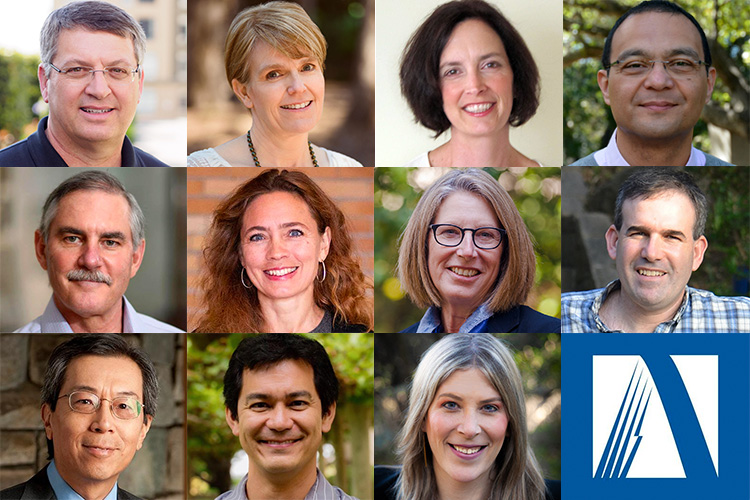New fellows of the American Association for the Advancement of Science
AAAS is the largest scientific society in the world and publisher of the journal Science
January 31, 2023

UC Berkeley’s new AAAS fellows. Left to right, starting at top left: David Drubin, Rebecca Heald, Sheri Johnson, Rodolfo Mendoza-Denton, David Moore, Kristin Persson, Whendee Silver, Dan Stamper-Kurn, Robert Tjian, Neil Tsutsui, Joni Wallis.
Eleven UC Berkeley faculty members have been elected lifetime fellows of the American Association for the Advancement of Science (AAAS), the world’s largest general scientific society and publisher of the journal Science.
The new members, among 508 total 2022 AAAS fellows, bring the number of UC Berkeley AAAS fellows — active and retired — to 226.
The new fellows are:
David Drubin, the Ernette Comby Chair in Microbiology and professor of molecular and cell biology, who was recognized “for distinguished contributions to the field of eukaryotic cell biology, in particular through functional studies of the actin and tubulin cytoskeleton and to the process of endocytosis.”
Rebecca Heald, professor of molecular and cell biology, “for distinguished contributions to the field of cell biology, particularly for creative approaches to the regulation of cell growth and division.”
Sheri Johnson, professor of psychology, “for distinguished contributions to the field of psychological science, particularly for the study of bipolar disorder, including a leading model of the condition and emotion-based impulsivity.”
Rodolfo Mendoza-Denton, professor of psychology, “for outstanding contributions to the science on the causes and consequences of prejudice and the identification of factors that serve to enhance academic success for individuals with historically minoritized identities.”
David Moore, professor and chair of nutritional sciences and toxicology, “for advancing our knowledge of nuclear hormone receptors and their role in metabolism and cancer.”
Kristin Persson, professor of materials science and engineering and director of the Molecular Foundry at Berkeley Lab, “for the conception and development of the Materials Project.”
Whendee Silver, professor and the Rudy Grah Chair in environmental science, policy and management and faculty scientist at Berkeley Lab, “for distinguished contributions to determine the biogeochemical effects of climate change and human impacts on the environment, and the potential for mitigating these effects.”
Dan Stamper-Kurn, professor of physics and faculty scientist at Berkeley Lab, “for distinguished contributions to the fields of quantum gases and quantum optics, particularly for experimental studies of Bose-Einstein condensates.”
Robert Tjian, professor of molecular and cell biology and investigator in the Howard Hughes Medical Institute, “for his pioneering contributions to understanding how genetic information in our DNA is decoded to sustain life.”
Neil Tsutsui, professor and Michelbacher Chair in environmental science, policy and management, “for figuring out kin recognition and its loss and other fundamental characteristics of unicolonial ants that know no boundaries.”
Joni Wallis, professor of psychology, “for distinguished contributions to systems and translational neuroscience, using single cell and neural oscillations to delineate the physiological basis of decision making and reward processing in the prefrontal cortex.”
The AAAS was founded as a nonprofit in 1848 and includes more than 250 affiliated societies and academies of science, serving 10 million individuals.
The new fellows will receive an official certificate and a gold and blue rosette pin via mail and will be invited to an in-person gathering in Washington, D.C., in the spring of 2023 to celebrate this honor.